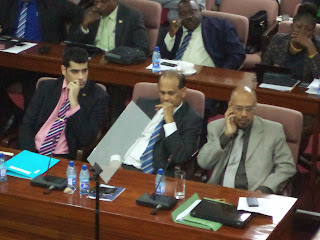'In general' is the keyword here, because defining our identity is precisely the most valuable and difficult exercise for people living in former colonies, such as the Republic of Suriname. After almost four centuries of colonial domination we need to make our identity and identification completely our own, suiting our own taste and according to our own views of ourselves.
The former colonized or enslaved inhabitants of Suriname were deprived of their own identity and lost their land, their family, their name and their right to self determination as a people, as a nation and as individuals.
Art Moengo Magic
in Marowijne district
If aliens were to come from outer space and land in Suriname today, their first questions would be;
Is this one nation or are these several nations?
Are these different peoples or is this one people?
Why are these people trying so hard to drag themselves down to the gutter, while they are all in the same boat?
Fortunately the influence of 'aliens' on Surinamese reality is reduced to continued media presence of Surinamese who live in the Netherlands, Europe, expressing their views on what Suriname needs.
The question remains if Western European standards should apply to Suriname's South American/Caribbean reality ?
The identity of a Surinamese inhabitant of African, Indian, Asian or Indigenous descent in the days of colonization, was determined by the racist views of colonizing authorities. They considered non-whites as servants, slaves or cheap laborers, at the service of white people who adhered to Judeo-Christian worldviews.
Ronny Brunswijk chairing National Assembly
in Paramaribo

River side bar at Atjoni in Brokopo district
The political coalition which is calling on voters to join them on the basis of anti-propaganda and mudslinging towards the incumbent government, appeals to voters who want a return to the 'good old days' when colonialism and a western vision of governance ruled the waves in Suriname. The most striking characteristic of the 'old politics' approach, is the racial aspect of their campaign and the appeal to voters to trust their party leadership unconditionally. In fact today's politicians of the largest political combination of parties are trying to revive the days when the people were asked to follow and trust unconditionally. Various politicians climb on election campaign platforms to accuse, vilify, and smear the reputation or political achievements of their opponents, debunking all that was done by their opponents and describing them in the most negative manner. What does this say about Surinamese politicians ? It sounds like a repetition of what we were taught about ourselves in colonial days, when we were told that we are worthless, despicable and incapable of anything good.
Government Ministers in National Assembly
The political identity of Suriname's voters is expressed by colors of their party flags, racial affiliations and support for political party programs. Society is still divided on the basis of those who belong to either the political or ruling, mostly white- ,asian or colored elites or to the majority of poor or less fortunate Indigenous, African, Asian , Hindu and Creole inhabitants.
The importance of surinamese identity grows drastically when the time to vote has arrived and identification as legal voter becomes crucial for the ruling elites in their various political configurations.
The chance to gain political power not only depends on the trustworthiness of the government which organizes elections, but more so on authorized legal voters who actually come to the ballot box and vote.
Senior Surinamese citizen in Saramacca district
Totness in Coronie district
The next generation of politicians has developed new ideas and defines Surinamese identity as part of the Caribbean. Young Surinamese are identifying Suriname as a Caribbean/Latin American nation and
claim their right to choose a Surinamese government on the basis of democratic principles. The next generation of voters and the new policy impact will determine how Suriname sees itself and identifies itself after coming elections on May 25th, 2015.
Suriname river Bakaa Boto rapids







Geen opmerkingen:
Een reactie posten